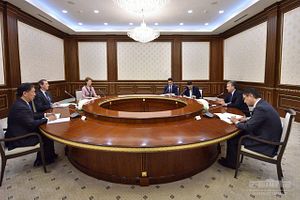World Bank officials are optimistic about Uzbekistan. The Bank’s vice president for Europe and Central Asia, Cyril Muller, made a two day visit to Tashkent this week, meeting with President Shavkat Mirziyoyev and other government officials. The visit underscores Uzbekistan’s continued march in from the periphery of international affairs.
Muller also made a visit to Westminster International University in Tashkent where he delivered remarks titled “Sharing My Optimism for Uzbekistan’s Future.” In those remarks, however, Muller tempered his optimism a small measure, noting that important changes — particularly in the economic sphere — “are creating stress for many today.” He posited higher bread, electricity, and gas prices as byproducts of “[s]ome of the very important changes that, over time, will bring opportunities and better services for all…”
Muller repeated a familiar theme: “[T]here is no going back.”
As Umida Hashimova noted in a Diplomat article earlier this month, Uzbek Foreign Minister Abdulaziz Kamilov gave an interview to German media around the time Mirziyoyev was visiting Germany in late January. In his interview, Kamilov responded to a question about how far reforms can go by stating, “Many ask how long these reforms will last, and whether there are risks of a backward step. There is no way back.” Kamilov commented that transitional phases are difficult, something Muller said this week as well: “Some of these opportunities may take time to materialize – we know from the experience of many other countries that economic transitions are not instantaneous and that more often than not there are bumps on the road.”
Taken together, these notes of caution read almost like pleas for patience. They also demonstrate a degree of synergy between the Uzbek government and experts in the development community. Notably, lists of key tasks uttered by Uzbek officials — such as Kamilov in his keynote speech at a recent international conference in Tashkent — are textbook: prioritizing multilateral cooperative mechanisms in the region on both economic and security matters, fomenting favorable trade conditions and standing up free trade regimes, building up regional transport networks, investing in tourism development, and so on.
In many of these areas, the World Bank and other development agencies have moved to offer Uzbekistan assistance. The World Bank’s lending commitments to Uzbekistan skyrocketed in 2018. A review of the last four years’ worth of World Bank overviews of its work in Uzbekistan (2015, 2016, 2017, 2018), demonstrates a noticeable change between 2017 and 2018. The 2017 (as well as 2016 and 2015) snapshots cite Bank commitments for 27 projects via the International Bank for Reconstruction and Development (IBRD) and the International Development Association (IDA) and 30 grants under technical assistance programs. The Spring 2018 snapshot, however, states that as of April 2018, the Bank had provided funding for 40 projects through the IBRD and IDA and sponsored more than 50 grants under technical assistance programs. That’s a veritable explosion of new projects. The October 2018 snapshot bumped it up to 41 projects.
As the World Bank engages more heavily with Uzbekistan familiar criticisms may arise: That a narrow focus on poverty alleviation and economic development, absent reform in the political arena or adequate anti-corruption mechanisms, simply isn’t enough. The Uzbek government will hear similar discordant notes: That there is too much focus on economic factors and not enough focus on domestic political reforms.
“Central Asia will be more prosperous and stable from a vibrant and competitive market economy in Uzbekistan that offers pathways to more and better jobs for the millions of its young citizens,” Muller said at Westminster International University. That certainly rings true, but the key to navigating those “bumps on the road” Muller mentioned is politics. The avenues of communication between the Uzbek people and their government are as important as new roads or railways.

































